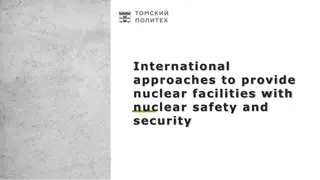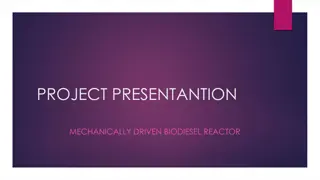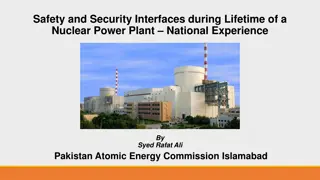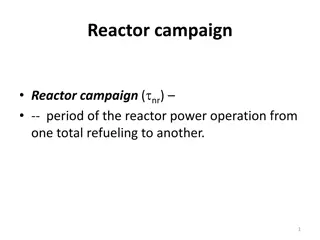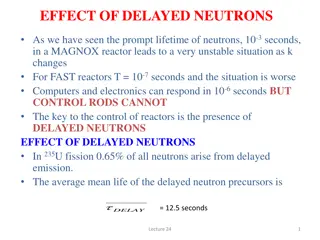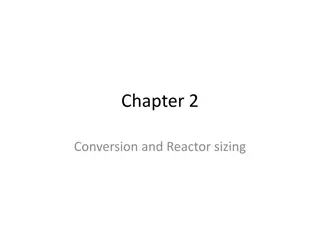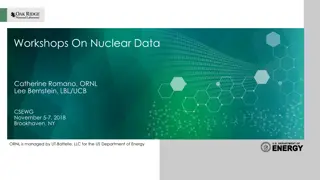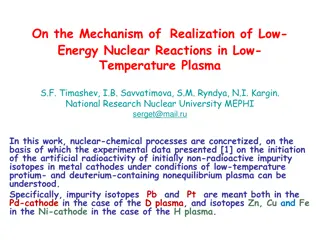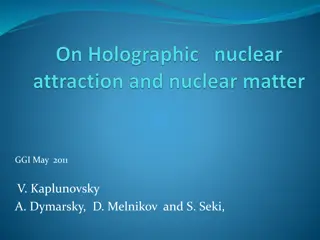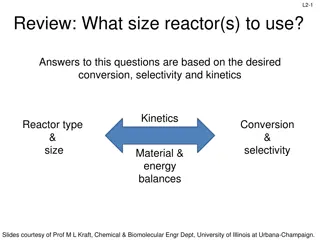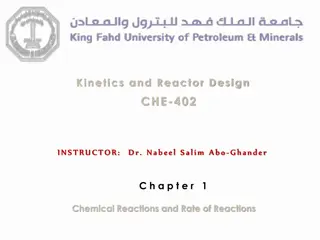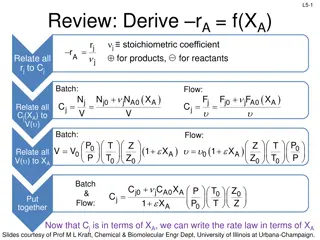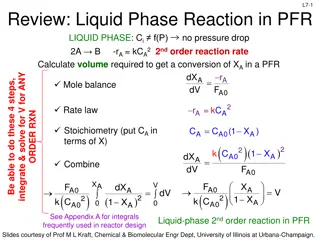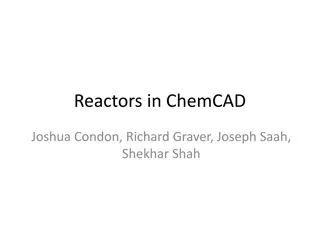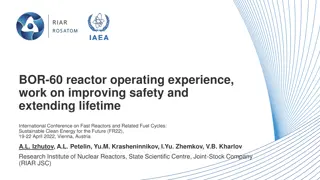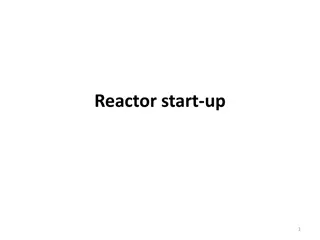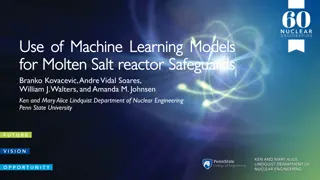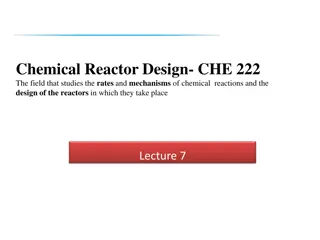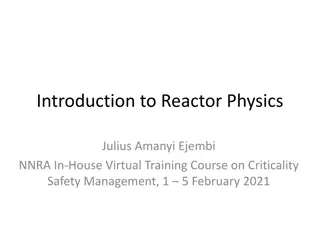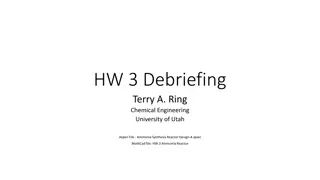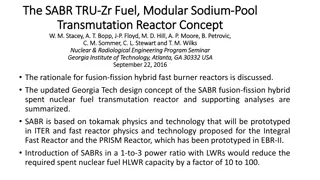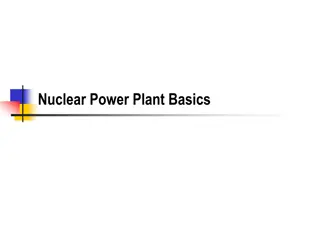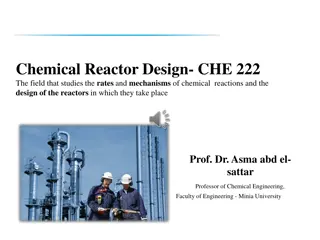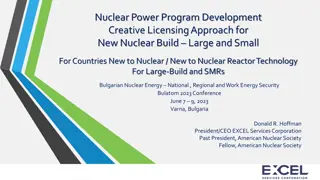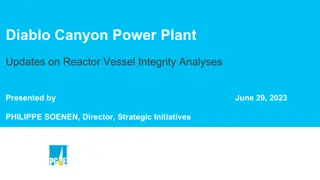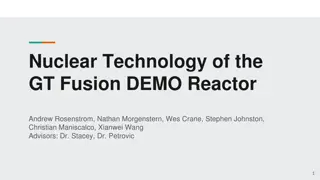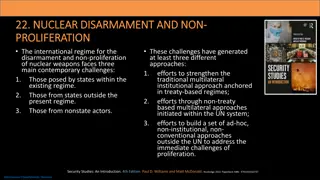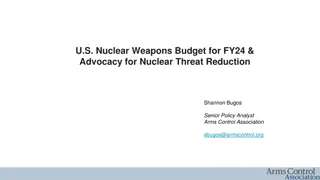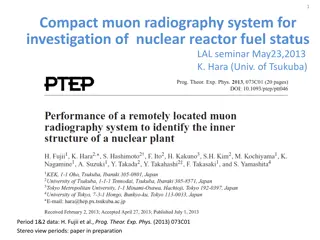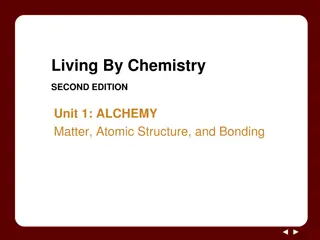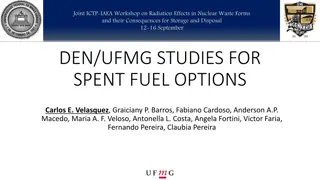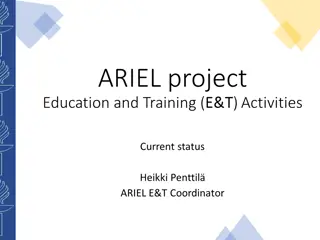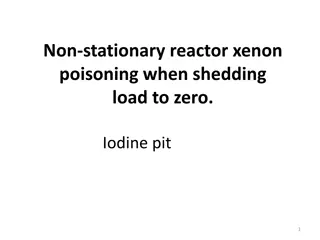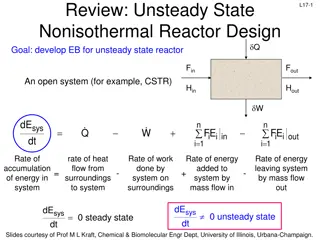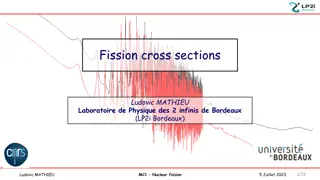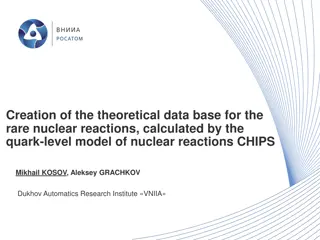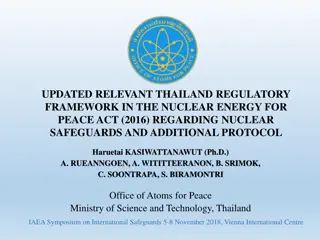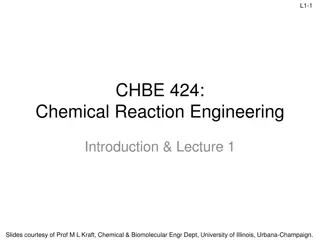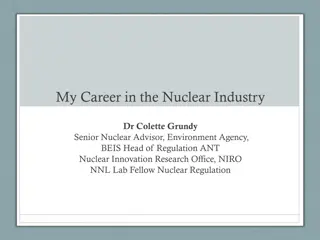International Approaches to Enhance Nuclear Safety and Security
Understanding the concepts of nuclear safety and security, their differences, and the importance of establishing a robust nuclear security culture are essential for safeguarding nuclear facilities. The International Atomic Energy Agency (IAEA) plays a significant role in promoting nuclear safety and
1 views • 10 slides
Mechanically Driven Biodiesel Reactor for Village-Level Production
This project introduces a mechanically-driven biodiesel reactor designed to empower older women caregivers in Kenya by utilizing a pedal-operated system for biodiesel production from non-edible oils. The reactor, driven by a treadle sewing machine, aims to provide a sustainable energy solution while
1 views • 18 slides
Ensuring Safety and Security in Pakistan's Nuclear Power Sector
Pakistan's Nuclear Power Sector operates several nuclear power plants under strict safety and security protocols regulated by the Pakistan Atomic Energy Commission and the Pakistan Nuclear Regulatory Authority. The focus is on achieving nuclear safety to prevent accidents and protect workers and the
0 views • 24 slides
Understanding Reactor Campaign in Nuclear Power Operations
Reactor campaign in nuclear power operations is crucial for ensuring safe and efficient reactor power operation. It involves managing reactivity margin, fuel residence time, nominal power, and effective days of operation. Reactor campaigns are influenced by various factors such as fuel elements' res
1 views • 64 slides
Understanding the Role of Delayed Neutrons in Reactor Control
Delayed neutrons play a crucial role in controlling nuclear reactors by providing a means to adjust reactivity. These delayed neutrons, emanating from fission processes in 235U, have a longer mean lifetime compared to prompt neutrons. This characteristic allows for a more manageable reactor operatio
0 views • 15 slides
Celebrating the Legacy of Magnox Reactors at Wylfa Nuclear Power Station
Explore the rich history and contributions of Magnox reactors at Wylfa Nuclear Power Station, from their pioneering role in electricity generation to the upcoming closure of the last reactor. Join us for insightful discussions on reactor design, waste management, and the future of nuclear energy. Di
0 views • 8 slides
Reactor Sizing and Conversion in Chemical Engineering
This chapter explores the sizing of Continuous Stirred Tank Reactors (CSTR) and Plug Flow Reactors (PFR) using conversion values and overall conversion. It covers the definition of conversion, batch reactor design equations, design equations for flow reactors, and more. The content delves into the m
0 views • 17 slides
Recent Developments in Nuclear Data and Workshops Summary
Recent events in nuclear data include workshops, whitepaper releases, interagency working group meetings, and roadmapping workshops aimed at enhancing nuclear data for various applications. DOE Nuclear Physics has organized interagency working group FOAs to improve nuclear data through collaborative
1 views • 22 slides
Mechanism of Low-Energy Nuclear Reactions in Low-Temperature Plasma
This work discusses nuclear-chemical processes underlying low-energy nuclear reactions in low-temperature plasma environments, focusing on the initiation of artificial radioactivity in metal cathodes under protium- and deuterium-containing nonequilibrium plasma conditions. The role of electrons with
4 views • 6 slides
Exploring Nuclear Interactions through Holography and Gauge/Gravity Duality
Holography and gauge/gravity duality have proven effective in understanding strong coupling problems in nuclear physics, such as the nuclear binding energy puzzle and limitations of large Nc. This article delves into the implications of applying these techniques to nuclear interactions and nuclear m
2 views • 73 slides
Reactor Sizing: Conversion, Selectivity, and Kinetics Overview
Understanding reactor design involves considerations such as desired conversion, selectivity, and kinetics. Key concepts include rate laws, molar balances, and reactor types. Through molar balance equations and reactor design processes, one can derive essential equations for ideal batch, CSTR, and P
2 views • 20 slides
Fundamentals of Chemical Kinetics and Reactor Design
Explore the realm of chemical reactions, rate equations, and reactor design in this informative chapter. Understand the factors influencing reaction rates, different types of reactions, rate laws, and experimental determination of reaction rates. Dive into examples illustrating stoichiometry and rat
0 views • 19 slides
Chemical Reactor Design Principles
Explore the fundamentals of chemical reactor design, including stoichiometry, reaction rates, and reactor scale-up. Learn to derive rate laws and design equations in terms of conversion for batch, CSTR, and PFR reactors. Discover the logic behind isothermal reactor design and calculation of required
0 views • 21 slides
Reactor Design Principles for Liquid and Gas-Phase Reactions
This material covers the design principles for liquid and gas-phase reactions in continuous flow reactors such as PFR (Plug Flow Reactor) and PBR (Packed Bed Reactor). It includes calculations for volume required to achieve a specific conversion, catalyst weight needed, and considerations for ideal
0 views • 21 slides
Understanding Reactors in ChemCAD: Models and Examples
ChemCAD offers various reactor models such as stoichiometric and equilibrium reactors for simulating chemical processes. Engineers can choose the appropriate model based on the reaction type and accuracy needed. Explore different reactor types through examples and process flow diagrams to enhance yo
0 views • 21 slides
BOR-60 Reactor Operating Experience and Design Configuration
The BOR-60 reactor, a key component of sustainable clean energy, has a rich history since its construction in the USSR. Its design configuration includes various components such as coolant inlet nozzles, control rod mechanisms, and fuel loading ducts. The core arrangement consists of control rods an
0 views • 12 slides
Understanding Reactor Start-up and Neutron Multiplication in Subcritical Reactors
Reactor start-up is a crucial operation that transitions a reactor from a subcritical state to a critical state by carefully adjusting reactivity levels. In a subcritical reactor, the neutron density should decrease over time but may not reach zero due to certain factors. Neutron multiplication fact
0 views • 66 slides
Machine Learning for Molten Salt Reactor Safeguards
Molten salt reactors face challenges in material accounting due to liquid fuel which precludes traditional safeguards. This project proposes a two-step approach involving the development of measurement signatures created by material diversion, and a machine learning model to distinguish normal react
1 views • 18 slides
Chemical Reactor Design: Rates, Mechanisms, and Reactor Types
The field of chemical reactor design encompasses studying reaction rates, mechanisms, and designing reactors for various processes. Factors such as reaction type, production scale, cost, safety, and more influence the choice of reactor scheme. Understanding reactor systems and applying engineering j
1 views • 15 slides
Introduction to Reactor Physics and Nuclear Fission
Explore the fundamentals of reactor physics, neutron interaction, and nuclear fission in this virtual training course on criticality safety management. Delve into the history of nuclear fission, symbolisms for atoms, and the significance of critical reactors like Fermi's Chicago Pile. Gain insights
0 views • 73 slides
Ammonia Reactor System Design and Optimization Study for High Efficiency
This material discusses the design and optimization of an ammonia synthesis reactor system for maximizing conversion efficiency while minimizing CAPEX costs. Various factors such as managing heat effects, reaction runaway prevention, and cooling profiles are explored. Recommendations include using a
3 views • 10 slides
Advanced Burner Reactor Concept and Subcritical SABR Design
Discusses the rationale behind fusion-fission hybrid fast burner reactors, focusing on the SABR concept for spent nuclear fuel transmutation. The SABR design aims to address challenges in nuclear power generation, waste disposal, and fuel efficiency by utilizing a subcritical advanced burner reactor
0 views • 15 slides
The Complexities of Nuclear Power: Advantages, Waste Management, Opposition, and Safety Concerns
Delve into the intricate world of nuclear power through various aspects such as its advantages, challenges in nuclear waste disposal, opposition movements, reactor safety concerns, and the financial implications of accidents. Explore the history, controversies, and ongoing debates surrounding nuclea
0 views • 13 slides
Overview of Chemical Reactor Design and Operation
Chemical reactor design involves studying the rates and mechanisms of chemical reactions, as well as the design of reactors for these reactions on a commercial scale. This field combines principles from thermodynamics, chemical kinetics, fluid mechanics, mass transfer, heat transfer, and economics t
0 views • 12 slides
Nuclear Power Program Development for Energy Security in New Nuclear Countries
EXCEL Services Corporation, led by Donald R. Hoffman, offers innovative licensing approaches for developing nuclear power programs in countries new to nuclear technology. With over 38 years of experience, EXCEL provides essential support services to ensure the success of new nuclear projects, addres
0 views • 25 slides
Diablo Canyon Power Plant Reactor Vessel Integrity Analyses Update
Updates on Diablo Canyon Power Plant's reactor vessel integrity analyses were presented by Philippe Soenen, Director of Strategic Initiatives, on June 29, 2023. The analysis includes background information, reactor vessel surveillance coupon withdrawal plans, and the request for Nuclear Regulatory C
0 views • 9 slides
Advancements in Fusion Reactor Technology: A Comprehensive Overview
This presentation delves into the nuclear design aspects, objectives, background, and state-of-the-art components of the GT Fusion DEMO Reactor project. It covers key areas such as tritium breeding ratio, neutron transport, temperature distribution, and material choices for optimal reactor performan
0 views • 31 slides
Contemporary Challenges in Nuclear Disarmament and Non-Proliferation Regime
The international regime for nuclear disarmament and non-proliferation faces challenges from states within and outside the regime, as well as non-state actors. Various approaches are being utilized to address these challenges, including strengthening multilateral institutions, non-treaty-based multi
0 views • 12 slides
U.S. Nuclear Weapons Budget for FY24 & Advocacy for Nuclear Threat Reduction Overview
The Fiscal Year 2024 budget for U.S. nuclear weapons activities is $56.6 billion, up by 11% from the FY23 request. The budget includes allocations for the Energy Department, Defense Department, and National Nuclear Security Administration for various nuclear weapon delivery systems and warheads. The
0 views • 5 slides
Compact Muon Radiography System for Investigation of Nuclear Reactor Fuel Status
A seminar presentation at LAL on May 23, 2013, discussed a compact muon radiography system designed for investigating the status of nuclear reactor fuel. The system, developed by researchers from the University of Tsukuba, involved the use of trackers with scintillators and muon detectors at various
0 views • 56 slides
Exploring Nuclear Chemistry: The Formation of New Elements
Delve into the fascinating world of nuclear chemistry with a focus on the formation of new elements through processes like radioactive decay, nuclear fusion, and nuclear fission. Understand how nuclear reactions change the identity of elements and explore the dynamics of nuclear chain reactions. Gai
0 views • 13 slides
Advancements in Nuclear Energy Research and Technology at UFMG
Explore the latest developments in nuclear energy research and technology at UFMG, including studies on radiation effects, nuclear waste forms, thorium reserves, and the National Institute of Science and Technology for Innovative Nuclear Reactors. The Nuclear Engineering Department at UFMG focuses o
0 views • 28 slides
Cutting-Edge Research in Nuclear Physics
Cutting-edge research in nuclear physics is showcased in this comprehensive list of supported education and training applications. Covering a wide range of topics such as time-of-flight spectroscopy, nuclear reactions, data analysis, and neutron capture measurements, this document highlights the wor
0 views • 6 slides
Reactor Xenon Poisoning and Iodine Pit Phenomenon
When a non-stationary reactor is shut down or its load is reduced to zero, xenon poisoning occurs due to the disruption of dynamic equilibrium between the increase and decrease of 135Xe. This leads to a temporary increase in 135Xe concentration, followed by a decrease as it decays. The reactivity ma
0 views • 58 slides
Chemical Reactor Design: Unsteady State and Nonisothermal Reactors
Developing energy balances for unsteady state and nonisothermal reactors is essential for designing efficient chemical reactors. The energy balances involve terms such as heat flow, work done, energy accumulation, and mass flow, which impact the reactor's performance. By considering factors like pha
0 views • 29 slides
Understanding Nuclear Fission Cross Sections
Nuclear fission cross sections play a crucial role in determining reaction rates in nuclear reactors and experiments. They represent the probability of nuclear interactions when neutrons collide with a nucleus, impacting fission and capture rates. These cross sections are influenced by factors such
0 views • 15 slides
Theoretical Data Base for Rare Nuclear Reactions Using Quark-Level Model
The creation of a theoretical data base for rare nuclear reactions using the CHIPS quark-level model is discussed in this research by Mikhail Kosov and Aleksey Grachkov from Dukhov Automatics Research Institute VNIIA. The study aims to predict cross-sections of unmeasured reactions, assess neutron-n
0 views • 18 slides
Thailand's Nuclear Safeguards Regulation in the Nuclear Energy for Peace Act (2016)
The Nuclear Energy for Peace Act (2016) in Thailand has updated nuclear safeguards regulations concerning nuclear safeguards and additional protocols. The regulations cover various aspects such as non-declared activities, complementary access, and specific ministerial regulations related to nuclear
0 views • 5 slides
Introduction to Chemical Reaction Engineering
Chemical Reaction Engineering (CRE) is crucial for understanding how chemical reactors operate in various processing operations. This field involves reactor design by integrating factors such as thermodynamics, kinetics, fluid mechanics, heat transfer, and economics. CRE aims to effectively design a
0 views • 16 slides
Dr. Colette Grundy: A Career in the Nuclear Industry
Dr. Colette Grundy has had a distinguished career in the nuclear industry, serving in various roles such as Senior Nuclear Advisor at the Environment Agency and Head of Regulation at BEIS. Her expertise spans from nuclear regulation to working with international agencies like USNRC and CNSC. She has
0 views • 15 slides
